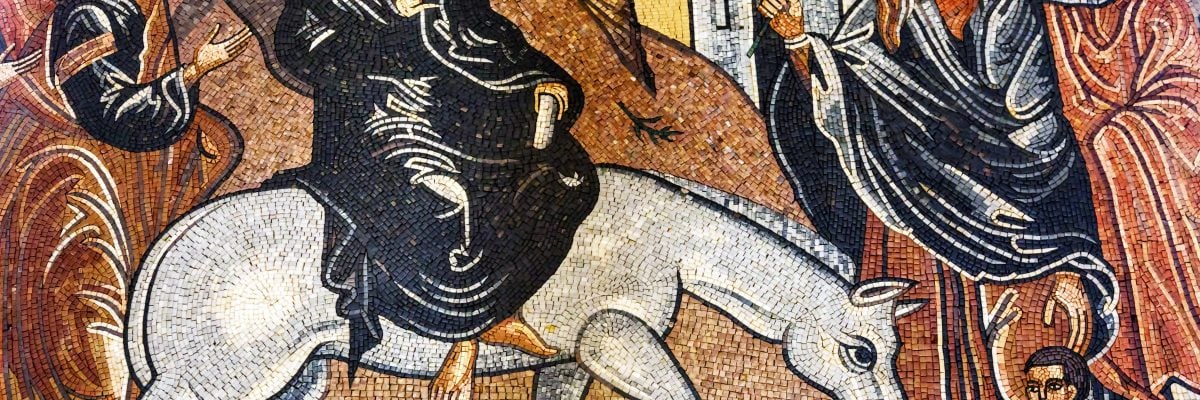
Homily for Palm Sunday, Year B
Blessed is he who comes in the name of the Lord! — Luke 19:38
How often do we repeat these words of the children of the Hebrews as they hailed the Savior on his entry into Jerusalem! Day in and day out, from the rising of the sun to its setting, in every one of the rites of the Church, East and West, and in hundreds of languages, these words ring out as the priest prepares to change the bread and wine we have offered into the very body and blood of Christ. It is estimated that the Holy Mass is celebrated at least 350,000 times a day on our planet in Catholic churches. Add to this number the Masses celebrated in the Eastern Churches not in communion with the Roman Church, and the number increases by at least another 100,000. “Blessed is he who comes in the name of the Lord!” indeed.
In other words, millions of voices join each day to proclaim what the people of the Holy City proclaimed as Our Lord prepared for the great drama of his passion and death and resurrection. And this is only right, since the Eucharist that they are daily celebrating contains the essence of the offering of the body and blood of the Lord, now glorious in the splendor of his resurrection and ascension.
Since we call the Lord “blessed” so often and in such a powerful context, wouldn’t it be a good idea to know what the word blessed means? Let’s take a look at what it means in the languages of Sacred Scripture—of Hebrew and Aramaic and Greek—and in our own liturgical languages of Latin and English. This easy little study can lead us to great and consoling insights into the nature of our worship of God in the Holy Trinity by the offering of the body and blood of Christ.
In Hebrew and Aramaic (which are related closely to each other, like Latin and Italian, but perhaps even closer), the word for blessed refers to a root meaning “to bend the knee” and thus means to worship.
But since worship always includes acclamation and praise, the Greek New Testament and the Greek Old Testament (called the Septuagint) translate this word as meaning one praised in speech, literally “well-spoken-of.”
The Latin Vulgate Bible, the basic version used in the Roman Church’s liturgy, follows the Greek and uses the word benedicere, again literally “to speak well of” someone or something: in other words, to praise in audible speech.
In English, we reach a level of meaning that is truly biblical in import, even if English was never a biblical language (and it never was, whatever translation we are devoted to!). The word bless in English comes from the Old English and earlier Proto-German. It is the same root as the word blood. And it means originally to consecrate or sanctify with the sprinkling of blood. This rite is common to many religions and was raised to the level of the revealed and divine worship by God’s revelation in the old law and its fulfillment in the new.
So here we have all the levels of meaning, especially for those who worship God in the English language: “Blessed is he who comes in the name of the Lord”: as in, “Worshipped is he on our knees, and praised with our audible words, who sanctifies us by the sprinkling of his blood.” This is practically a verbal description of what happens when the faithful at Holy Mass sing or recite the Benedictus and then kneel in expectation of that amazing, divine sprinkling with the precious blood of the Lord, whereby they are blessed with same blessing with which the Son of God is blessed!
How fortunate we are on this Palm Sunday to acclaim the Lord once more at Holy Mass. May the awareness of the deep sense of the words we say there lead us to a deeper and more confident participation in the great mysteries of our salvation that we are about to celebrate and renew in this year of grace and salvation 2018!
Blessed also are we, who come together at Holy Mass in the name of the Lord. May his precious blood cleanse us and renew us to offer true worship and worthy praise to the Father, the Son, and the Holy Spirit, to whom be glory and honor in the Church world without end. Amen!



